China Brands, Marketing & Consumers
Hot Pot Paradise? This is China’s First 24/7 Digital Self-Service Hot Pot Supermarket
Chinese restaurant chain Wodi Hotpot (卧底火锅) is the new kid on the block in hot pot land. The start-up is China’s first digital self-service hot pot supermarket and restaurant. Combining China’s new digital trends with traditional tasty cuisine, Wodi is the typical post-1985 generation’s place to be.
Published
8 years agoon
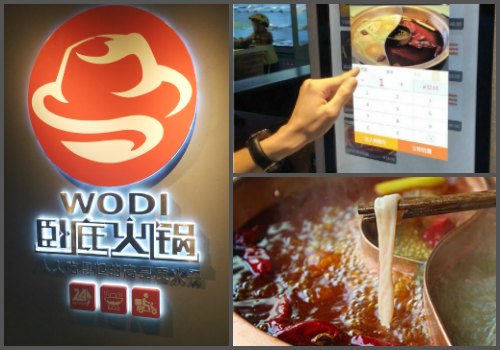
WHAT’S ON WEIBO ARCHIVE | PREMIUM CONTENT ARTICLE
Chinese restaurant chain Wodi Hotpot (卧底火锅) is the new kid on the block in hot pot land. The start-up is China’s first digital self-service hot pot supermarket and restaurant. Combining China’s new digital trends with traditional tasty cuisine, Wodi is the typical post-1985 generation’s place to be. What’s on Weibo tried it out for you. [This is a premium content article.]
Hot pot cravings can come at any time. For those who want a tasty and affordable hot pot, whether it is in the wee hours of the morning or in the late hours of the night, there is a new popular Chinese 24-hour hot pot self-service supermarket & restaurant where digital is key.
It is not just its 24/7 opening hours and digital order-and-pay system that make this place special; their online-to-offline business model, supplier dynamics and revenue model all make Wodi Hot Pot (卧底火锅) a pioneering company in the wonderful world of Chinese hot pot.

‘Hot pot’ in Chinese is huǒguō (火锅), literally: ‘fire pot’. It has a history of over 1000 years, and it is generally agreed that the Chinese hotpot tradition must have come from Mongol warriors who camped outside and had dinner together circled around a pot on the fire. The idea is that while the hot pot brew is kept boiling, fresh ingredients are placed into the pot and are cooked at the table. Nowadays, hot pot tastes vary greatly across different regions in China, but what matters most is its enjoyment: sitting with friends and family around the boiling stew, sharing food, eating slowly, and talking.
The founder of Wodi, Qiu Xingxing (邱星星), once had the most delicious hotpots for 30 days straight in Chongqing and Sichuan. He then jokingly told his friend he would one day start his own hotpot restaurant. And it came true. The “digital self-service restaurant” Wodi Hot Pot first opened its doors to hot pot lovers in Beijing in January of 2016. The online platform of Wodi was established in October of 2015, with the offline supermarket/restaurant following a few months later.
Wodi’s Qiu Xingxing (see picture) is a post-1985 Chinese online entrepreneur who also co-founded the successful WOWO (55tuan.com), which is also known as ‘the Groupon of China’. Qiu is no stranger to e-commerce and its extreme potential; WOWO was the first Chinese company of its kind to be listed on the NASDAQ stock exchange in 2015.
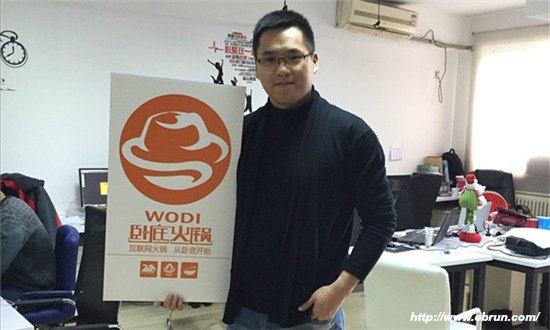
In a way, Wodi is a typical Chinese post-1980 or post-1985 generation outlet. The post-1980s is a generation that is known for still valuing tradition but also being creative and innovative and not afraid to try out new things.
Wodi is described as a “Hot Pot Online to Offline Platform” (火锅O2O平台) by Chinese media, as its online business lies at the core of the company. On Weibo, Wodi calls itself “the world’s biggest online hotpot platform” (全球最大的互联网火锅平台), through which customers are driven to visit their offline stores. Wodi is well-known for its online food delivery services. Although ordering in hot pot is popular and convenient, going to the actual Wodi “offline restaurant” (线下门店) for some hot shopping and dining is far more exciting.
“It’s fu*king cheap!”
Dining at this new hot pot chain is not just a nice experience, it is also surprisingly affordable. “It’s fu*king cheap!” allegedly is a catchphrase often used by Wodi’s young customers, founder Qiu Xingxing tells Ebrun magazine.
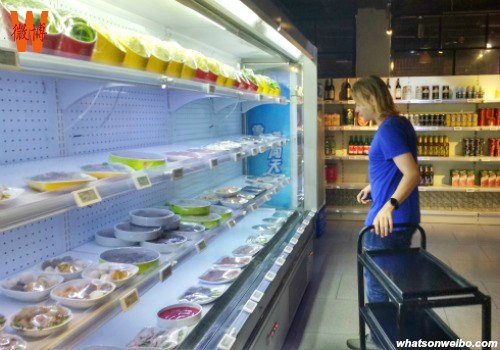 So much to choose from in the Wodi Hotpot supermarket.
So much to choose from in the Wodi Hotpot supermarket.
One of the main reasons the Wodi Hotpot supermarket is relatively inexpensive is because Qiu decided to drastically change the supplier/supermarket dynamics in the Wodi outlet. [blendlebutton] Instead of working with the typical distribution system, where supermarket owners purchase from food suppliers and then resell to customers at a (much) higher rate, Wodi lets suppliers directly sell their food to its consumers. Because there is no intermediary profit, the prices at Wodi are exceptionally low.
The supermarket has a wide selection of products, offering all kinds of hotpot ingredients, such as a variety of mushrooms, fish, tofu, thin-sliced beef, etc. Besides the classic hotpot ingredients, they also sell sodas, beer, candy and snacks, and even Wodi’s own hotpots to take home (32¥/±4,8US$), all priced at a much lower rate than other well-known hotpot places such as Haidilao (海底捞).
You’re probably wondering – if Wodi does not make much profit from the food it sells, then how do they make money? Enterpreneur Qiu has thought of a new business model for this to be able to provide customers with low-priced qualitative food while still having a profitable business.
“The world’s 2nd time-based hotpot restaurant.”
Wodi’s success formula lies in the original concept of the outlet, that has a supermarket area and a separate dining area. When you have purchased hotpot ingredients in the supermarket, you sit and eat in the Wodi restaurant at a hotpot table – which you rent for a time-based price.
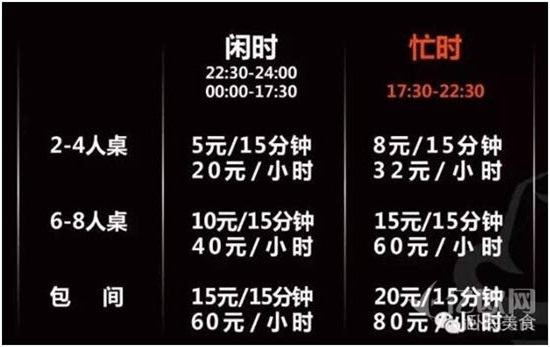
The time-based costs vary on the size of the table and if it is peak hour or not. For a 2-4 person table during quiet hours, customers pay 5¥ (±0.75$) per 15 minutes or 20¥ (±3$) per hour. During the peak hours (17.30-22.30) this is 32¥ (±4.8$) per hour. For larger groups up to 8 people, quiets hours are rated at 40¥ (±6$) and busy hours at 60¥ (±9$). Private rooms are also available for 60¥ (±9$) and 80¥ (±12$).
By working with rentable hotpot tables, Qiu is a pioneer in his field. If you walk into the Wodi venue, a slogan on the wall reads “the world’s 2nd time-based hotpot restaurant” (“全国第二家按用餐时长收费的火锅”). When a journalist from the 36kr.com business news site asked founder Qiu where the world’s 1st time-based hotpot was based, he told them: “There is none. It is just that China’s advertising laws don’t allow companies to use the term ‘the first’/’number one’ (‘第一’), so we turned it into ‘the second’. Actually, we’re the first.”
The first Wodi restaurant in Beijing’s Chaoyang is over 1000 square meter and offers 206 seatings, with maximum table turnover possibilities since the place is opened 24 hours. The Wodi restaurant became popular and packed right after its opening.
“You just need to bring your mobile phone.”
Stepping into the Wodi near the Worker’s Stadium in Beijing, visitors are immediately directed towards the supermarket that has baskets and trolleys for people to put their hotpot food on. The first stop is the touch-screen ordering system for the kind of hotpot you want, which is where one employer gives us a Wodi card that we need to swipe when ordering.
There are multiple types of hotpot stew to choose from – from extremely spicy to non-spicy, from a tomato-base stew to a garlic-based one, or better: have a half/half one so that you can combine two flavors. Most of the stews are priced around 30-35¥ (±4.5-5US$).
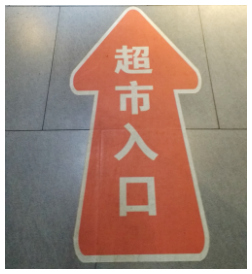 Supermarket entrance.
Supermarket entrance.
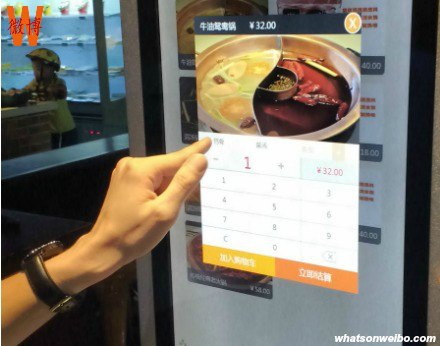
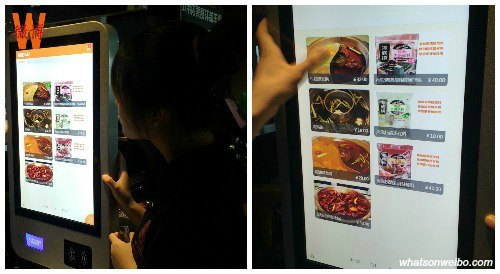 Customers can select and order their favorite hot pot stews through touch screens.
Customers can select and order their favorite hot pot stews through touch screens.
After the order for the hotpot stew is completed, the shopping can begin. The supermarket offers a variety of fresh foods – some great mushrooms and vegetables, soft and hard tofu kinds, noodles, intestines, fish heads, octopus, shrimps, and more. Meat can be ordered and cut at the center counter.

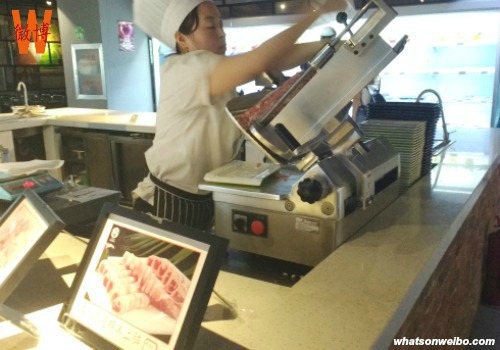 The supermarket counter where an employee slices the meat for you.
The supermarket counter where an employee slices the meat for you.
Once you’ve collected all you want to eat (no worries, you can always hop back in and out to get more food and drinks), the food is scanned at the special Wodi check out counter, where again you swipe the card to “pay” for it.
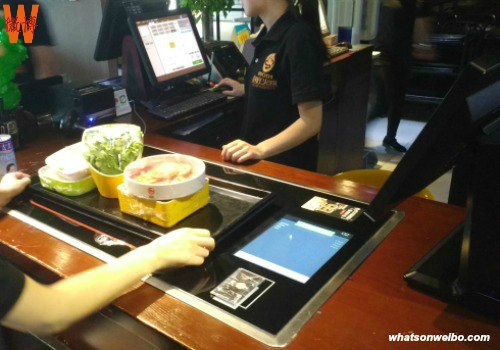
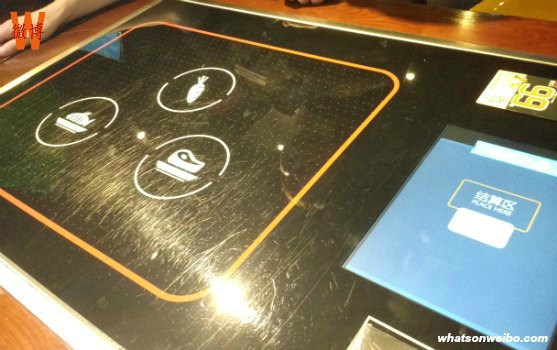
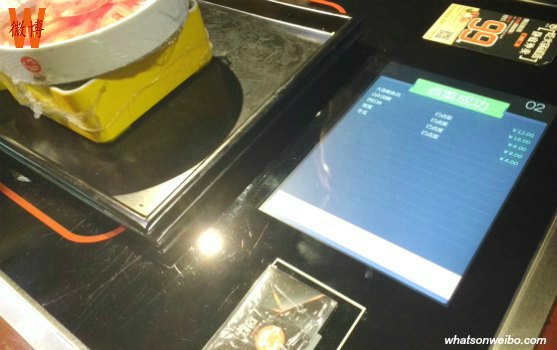 Wodi’s supermarket checkout system.
Wodi’s supermarket checkout system.
Wodi has a great selection of different hotpot sauces that are all free. The most common one in Beijing is the plain majiang (sesame paste) dipping sauce, but there are many other options available at Wodi including ways to make your hotpot sauce more exciting by adding cilantro, garlic, chili, etc.
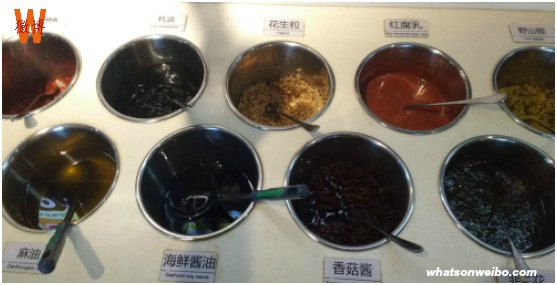
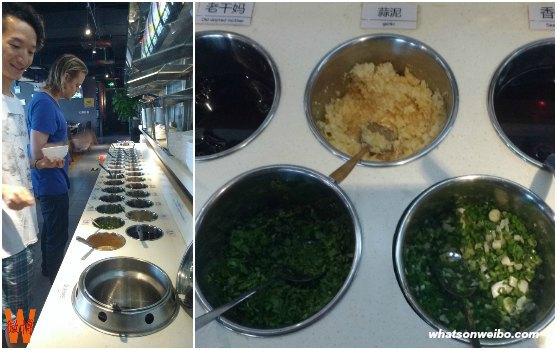
Once at the table, your ordered hotpot is prepared by the Wodi staff and hot potting can start. Except for the hot pot placement, Wodi is completely self-service as there are no employees who will serve you drinks or food. You will have to step back into the supermarket to get your own stuff, and cook your own food in the pot.
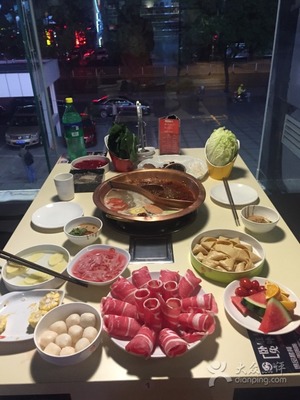
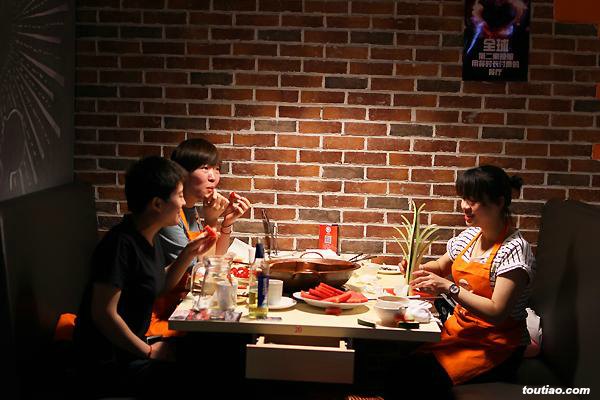
Wodi does all it can to make their customers as comfortable as possible to make them stay longer at the rented table. Tables have outlets to recharge mobile phones, there is free wifi, hair bands to keep the hair out of your face, and aprons to protect clothes from hotpot stains. In the meantime, the time for the table is counted by every 15 minutes you use it.
When food is finished and the bellies are full, it is time to pay. In a digital-focused store like Wodi, WeChat pay is the way to go, although there are other payment options available. As long as you have WeChat credit, “you just need to bring your mobile phone”, as my fellow hotpotters say, and you’re done. You give employees the Wodi card which you used for the supermarket and the table-time costs are added to it. For three persons spending multiple hours at Wodi eating and drinking, we spent a total of 240¥ (36US$)
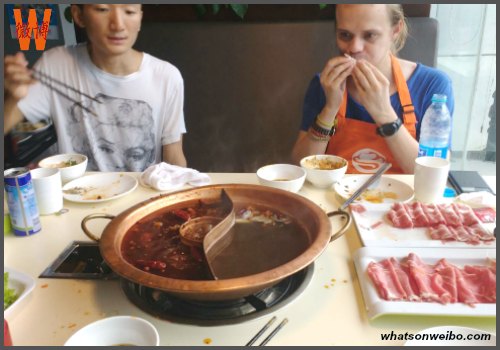
For the true hotpot connoisseurs, Wodi might not be your hotpot heaven for its tastes are classic but not as refined as renowned hot pot restaurants in China. But for its price, quality, cleanliness, comfort, and above all, its no-nonsense, self-service, digital approach, Wodi is the place to go.
According to its founder, this is still the “1.0 phase” of Wodi, with the future “2.0 Wodi” offering customers more digital options and services. Keep an eye on this one – it might just be the hot pot paradise China’s digital-loving hot pot foodies have been waiting for.
– By Manya Koetse
Follow @WhatsOnWeibo
Wodi Hotpot Address:
Beijing, Chaoyang,
East Gongti Road 工体东路20号春平广场
1st Floor Chunping Plaza
Branch in Beijing, Wangjing
悠乐汇C座3楼359室
Youlehui C/Building 3, 359
©2016 Whatsonweibo. All rights reserved. Do not reproduce our content without permission – you can contact us at info@whatsonweibo.com.
[/blendlebutton]
Manya Koetse is the founder and editor-in-chief of whatsonweibo.com. She is a writer, public speaker, and researcher (Sinologist, MPhil) on social trends, digital developments, and new media in an ever-changing China, with a focus on Chinese society, pop culture, and gender issues. She shares her love for hotpot on hotpotambassador.com. Contact at manya@whatsonweibo.com, or follow on Twitter.

Also Read
China Books & Literature
Why Chinese Publishers Are Boycotting the 618 Shopping Festival
Bookworms love to get a good deal on books, but when the deals are too good, it can actually harm the publishing industry.
Published
2 months agoon
June 8, 2024By
Ruixin Zhang
JD.com’s 618 shopping festival is driving down book prices to such an extent that it has prompted a boycott by Chinese publishers, who are concerned about the financial sustainability of their industry.
When June begins, promotional campaigns for China’s 618 Online Shopping Festival suddenly appear everywhere—it’s hard to ignore.
The 618 Festival is a product of China’s booming e-commerce culture. Taking place annually on June 18th, it is China’s largest mid-year shopping carnival. While Alibaba’s “Singles’ Day” shopping festival has been taking place on November 11th since 2009, the 618 Festival was launched by another Chinese e-commerce giant, JD.com (京东), to celebrate the company’s anniversary, boost its sales, and increase its brand value.
By now, other e-commerce platforms such as Taobao and Pinduoduo have joined the 618 Festival, and it has turned into another major nationwide shopping spree event.
For many book lovers in China, 618 has become the perfect opportunity to stock up on books. In previous years, e-commerce platforms like JD.com and Dangdang (当当) would roll out tempting offers during the festival, such as “300 RMB ($41) off for every 500 RMB ($69) spent” or “50 RMB ($7) off for every 100 RMB ($13.8) spent.”
Starting in May, about a month before 618, the largest bookworm community group on the Douban platform, nicknamed “Buying Like Landsliding, Reading Like Silk Spinning” (买书如山倒,看书如抽丝), would start buzzing with activity, discussing book sales, comparing shopping lists, or sharing views about different issues.

Social media users share lists of which books to buy during the 618 shopping festivities.
This year, however, the mood within the group was different. Many members posted that before the 618 season began, books from various publishers were suddenly taken down from e-commerce platforms, disappearing from their online shopping carts. This unusual occurrence sparked discussions among book lovers, with speculations arising about a potential conflict between Chinese publishers and e-commerce platforms.
A joint statement posted in May provided clarity. According to Chinese media outlet The Paper (@澎湃新闻), eight publishers in Beijing and the Shanghai Publishing and Distribution Association, which represent 46 publishing units in Shanghai, issued a statement indicating they refuse to participate in this year’s 618 promotional campaign as proposed by JD.com.
The collective industry boycott has a clear motivation: during JD’s 618 promotional campaign, which offers all books at steep discounts (e.g., 60-70% off) for eight days, publishers lose money on each book sold. Meanwhile, JD.com continues to profit by forcing publishers to sell books at significantly reduced prices (e.g., 80% off). For many publishers, it is simply not sustainable to sell books at 20% of the original price.
One person who has openly spoken out against JD.com’s practices is Shen Haobo (沈浩波), founder and CEO of Chinese book publisher Motie Group (磨铁集团). Shen shared a post on WeChat Moments on May 31st, stating that Motie has completely stopped shipping to JD.com as it opposes the company’s low-price promotions. Shen said it felt like JD.com is “repeatedly rubbing our faces into the ground.”
Nevertheless, many netizens expressed confusion over the situation. Under the hashtag topic “Multiple Publishers Are Boycotting the 618 Book Promotions” (#多家出版社抵制618图书大促#), people complained about the relatively high cost of physical books.
With a single legitimate copy often costing 50-60 RMB ($7-$8.3), and children’s books often costing much more, many Chinese readers can only afford to buy books during big sales. They question the justification for these rising prices, as books used to be much more affordable.
Book blogger TaoLangGe (@陶朗歌) argues that for ordinary readers in China, the removal of discounted books is not good news. As consumers, most people are not concerned with the “life and death of the publishing industry” and naturally prefer cheaper books.
However, industry insiders argue that a “price war” on books may not truly benefit buyers in the end, as it is actually driving up the prices as a forced response to the frequent discount promotions by e-commerce platforms.
China News (@中国新闻网) interviewed publisher San Shi (三石), who noted that people’s expectations of book prices can be easily influenced by promotional activities, leading to a subconscious belief that purchasing books at such low prices is normal. Publishers, therefore, feel compelled to reduce costs and adopt price competition to attract buyers. However, the space for cost reduction in paper and printing is limited.
Eventually, this pressure could affect the quality and layout of books, including their binding, design, and editing. In the long run, if a vicious cycle develops, it would be detrimental to the production and publication of high-quality books, ultimately disappointing book lovers who will struggle to find the books they want, in the format they prefer.
This debate temporarily resolved with JD.com’s compromise. According to The Paper, JD.com has started to abandon its previous strategy of offering extreme discounts across all book categories. Publishers now have a certain degree of autonomy, able to decide the types of books and discount rates for platform promotions.
While most previously delisted books have returned for sale, JD.com’s silence on their official social media channels leaves people worried about the future of China’s publishing industry in an era dominated by e-commerce platforms, especially at a time when online shops and livestreamers keep competing over who has the best book deals, hyping up promotional campaigns like ‘9.9 RMB ($1.4) per book with free shipping’ to ‘1 RMB ($0.15) books.’
This year’s developments surrounding the publishing industry and 618 has led to some discussions that have created more awareness among Chinese consumers about the true price of books. “I was planning to bulk buy books this year,” one commenter wrote: “But then I looked at my bookshelf and saw that some of last year’s books haven’t even been unwrapped yet.”
Another commenter wrote: “Although I’m just an ordinary reader, I still feel very sad about this situation. It’s reasonable to say that lower prices are good for readers, but what I see is an unfavorable outlook for publishers and the book market. If this continues, no one will want to work in this industry, and for readers who do not like e-books and only prefer physical books, this is definitely not a good thing at all!”
By Ruixin Zhang, edited with further input by Manya Koetse
Independently reporting China trends for over a decade. Like what we do? Support us and get the story behind the hashtag by subscribing:
Spotted a mistake or want to add something? Please let us know in comments below or email us. First-time commenters, please be patient – we will have to manually approve your comment before it appears.
©2024 Whatsonweibo. All rights reserved. Do not reproduce our content without permission – you can contact us at info@whatsonweibo.com.
China Brands, Marketing & Consumers
Chinese Sun Protection Fashion: Move over Facekini, Here’s the Peek-a-Boo Polo
From facekini to no-face hoodie: China’s anti-tan fashion continues to evolve.
Published
2 months agoon
June 6, 2024
It has been ten years since the Chinese “facekini”—a head garment worn by Chinese ‘aunties’ at the beach or swimming pool to prevent sunburn—went international.
Although the facekini’s debut in French fashion magazines did not lead to an international craze, it did turn the term “facekini” (脸基尼), coined in 2012, into an internationally recognized word.

The facekini went viral in 2014.
In recent years, China has seen a rise in anti-tan, sun-protection garments. More than just preventing sunburn, these garments aim to prevent any tanning at all, helping Chinese women—and some men—maintain as pale a complexion as possible, as fair skin is deemed aesthetically ideal.
As temperatures are soaring across China, online fashion stores on Taobao and other platforms are offering all kinds of fashion solutions to prevent the skin, mainly the face, from being exposed to the sun.

One of these solutions is the reversed no-face sun protection hoodie, or the ‘peek-a-boo polo,’ a dress shirt with a reverse hoodie featuring eye holes and a zipper for the mouth area.

This sun-protective garment is available in various sizes and models, with some inspired by or made by the Japanese NOTHOMME brand. These garments can be worn in two ways—hoodie front or hoodie back. Prices range from 100 to 280 yuan ($13-$38) per shirt/jacket.

The no-face hoodie sun protection shirt is sold in various colors and variations on Chinese e-commerce sites.
Some shops on Taobao joke about the extreme sun-protective fashion, writing: “During the day, you don’t know which one is your wife. At night they’ll return to normal and you’ll see it’s your wife.”

On Xiaohongshu, fashion commenters note how Chinese sun protective clothing has become more extreme over the past few years, with “sunburn protection warriors” (防晒战士) thinking of all kinds of solutions to avoid a tan.

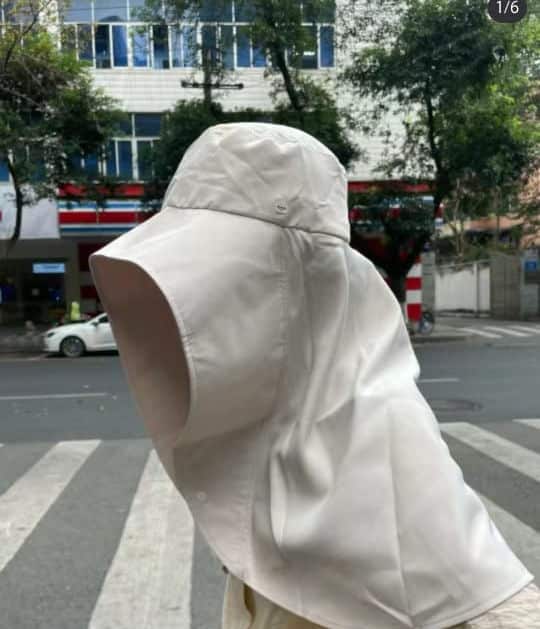


Although there are many jokes surrounding China’s “sun protection warriors,” some people believe they are taking it too far, even comparing them to Muslim women dressed in burqas.

Image shared on Weibo by @TA们叫我董小姐, comparing pretty girls before (left) and nowadays (right), also labeled “sunscreen terrorists.”
Some Xiaohongshu influencers argue that instead of wrapping themselves up like mummies, people should pay more attention to the UV index, suggesting that applying sunscreen and using a parasol or hat usually offers enough protection.
By Manya Koetse, with contributions by Miranda Barnes
Spotted a mistake or want to add something? Please let us know in comments below or email us. First-time commenters, please be patient – we will have to manually approve your comment before it appears.
©2024 Whatsonweibo. All rights reserved. Do not reproduce our content without permission – you can contact us at info@whatsonweibo.com.
Subscribe

Weibo Watch: The Future is Here

“Bye Bye Biden”: Biden’s Many Nicknames in Chinese

Enjoying the ‘Sea’ in Beijing’s Ditan Park

A Triumph for “Comrade Trump”: Chinese Social Media Reactions to Trump Rally Shooting

Weibo Watch: Get Up, Stand Up

The Tragic Story of “Fat Cat”: How a Chinese Gamer’s Suicide Went Viral

“Old Bull Eating Young Grass”: 86-Year-Old Chinese Painter Fan Zeng Marries 36-Year-Old Xu Meng

A Brew of Controversy: Lu Xun and LELECHA’s ‘Smoky’ Oolong Tea

Singing Competition or Patriotic Fight? Hunan TV’s ‘Singer 2024’ Stirs Nationalistic Sentiments

Zara Dress Goes Viral in China for Resemblance to Haidilao Apron

Weibo Watch: The Battle for the Bottom Bed

About the “AI Chatbot Based on Xi Jinping” Story

China’s Intensified Social Media Propaganda: “Taiwan Must Return to Motherland”

Weibo Watch: Telling China’s Stories Wrong

Saying Goodbye to “Uncle Wang”: Wang Wenbin Becomes Chinese Ambassador to Cambodia
Get in touch
Would you like to become a contributor, or do you have any tips or suggestions? Get in touch here!
Popular Reads
-

 China Insight3 months ago
China Insight3 months agoThe Tragic Story of “Fat Cat”: How a Chinese Gamer’s Suicide Went Viral
-

 China Music4 months ago
China Music4 months agoThe Chinese Viral TikTok Song Explained (No, It’s Not About Samsung)
-

 China Digital10 months ago
China Digital10 months agoToo Sexy for Weibo? Online Discussions on the Concept of ‘Cābiān’
-

 China Arts & Entertainment12 months ago
China Arts & Entertainment12 months agoBehind 8 Billion Streams: Who is Dao Lang Cursing in the Chinese Hit Song ‘Luocha Kingdom’?






